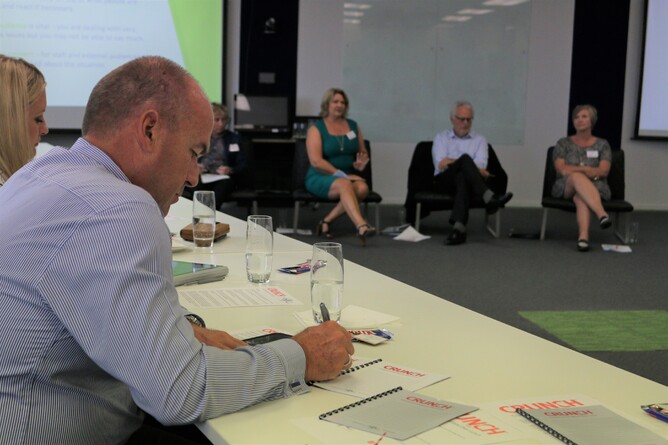A group of senior Waikato business leaders gathered this week to discuss the implications of the Weinstein scandal and #MeToo movement on business in New Zealand.
Experts from legal, human resources, governance and communications spoke to a room of CEOs, GMs and business and social services executives about sexual harassment in the workplace and how businesses and organisations in New Zealand must do more to plan for and better manage these situations.
HMC Communications Director Heather Claycomb says it’s incredible to think that the indiscretions of one man, Harvey Weinstein, have created such a tipping point around harassment, leading to the #MeToo movement.
“It might be easy to assume this is all about Hollywood, or that it’s nothing to do with businesses in New Zealand, but what we’ve seen in the past few months is a sea-change in how harassment is viewed and the expectations on those who know something is going on but do nothing about it,” said Claycomb. “This is not only impacting individual’s lives but also impacting the reputations of big organisations around the world who aren’t handling situations well.”
Senga Allen, managing director of Hamilton human resources firm Everest, said that business leaders need to look at the company culture they want to create and ensure they have policies and procedures in place so that when an incident occurs, or a harassment complaint or defamation case is made, they are prepared to act.
Media lawyer, Willy Akel from Simpson Grierson, said an organisation’s senior leaders need to act quickly if an allegation of sexual misconduct is made against a staff member.
“This is your reputation at stake here and you need to get everyone in the room together, so you are on the same page,” said Akel. “The first thing to do is get your key decision makers together right away – the CEO and the senior management team, plus your human resources and communications advisors.”
Company director Craig McFarlane said from a governance perspective it was important to plan for such a crisis and get professional help – from outside the organisation if needed. “Boards should be directing CEOs to report on the number and seriousness of staff incidents involving sexual misconduct, bullying and similar misconduct.”
“Directors need to understand what is happening inside the organisation they govern. If reports of misconduct are rife, that can signal a culture issue. And when a corporate culture is unhealthy, not only are there health and welfare risks to staff but the company reputation is at risk as well,” McFarlane said.
The event, organised by HMC Communications, was held at Waikato Innovation Park in Hamilton. It was the second in a learning lunch series called CRUNCH – Crucial Conversations over Lunch – for senior business leaders and those charged with protecting their organisation’s reputation.
“When people prepare for a crisis, or pull out their crisis manual, they have often prepared for situations like a fire burning down a building or an employee workplace death – which are operations situations. When it comes a reputational crisis, we find companies are often unprepared,” said Claycomb.
Claycomb also suggested that boards and leadership teams take the time to put the #MeToo movement on their agenda.
“Take 15 minutes to talk with your leadership team about situations such as the #MeToo movement and how it could impact on the organisation. Talk about how you would react if a staff incident occurs tomorrow. And discuss what you should do to prepare if an incident occurs in the future,” said Claycomb.
“Also, ask yourself is the culture at work such that people feel they can come to their boss or HR advisor first, rather than posting on social media or calling a journo?”
For more information on the CRUNCH series or for comment on the Weinstein scandal and its impact on business, please contact HMC Communications.
